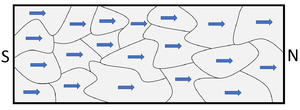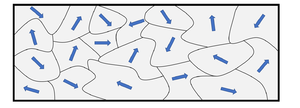Difference between revisions of "Permanent Magnet"
(Created page with "==Key Stage 3== ===Meaning=== A '''permanent magnet''' is an object with its own magnetic field that remains there even when there are no other external...") |
|||
| (5 intermediate revisions by 2 users not shown) | |||
| Line 14: | Line 14: | ||
: A [[Bar Magnet|bar magnet]] is a '''permanent magnet'''. | : A [[Bar Magnet|bar magnet]] is a '''permanent magnet'''. | ||
: '''Permanent magnets''' are used in a electrical [[D.C. Motor|motor]]s. | : '''Permanent magnets''' are used in a electrical [[D.C. Motor|motor]]s. | ||
| + | : A [[magnet]] is made of several small [[Magnetic Domain|magnetic domains]] which are regions in the [[magnet]] which act as smaller [[magnet]]s. In a '''permanent magnet''' these [[Magnetic Domain|magnetic domains]] are fixed in place and need [[energy]] to change their [[magnet]]ic direction. | ||
: A '''permanent magnet''' can only lose its [[Magnetic Field|magnetic field]] under certain conditions: | : A '''permanent magnet''' can only lose its [[Magnetic Field|magnetic field]] under certain conditions: | ||
*When it is struck with a sudden [[force]]. | *When it is struck with a sudden [[force]]. | ||
*When it is [[heated]]. | *When it is [[heated]]. | ||
*When an extremely strong external [[Magnetic Field|magnetic field]] is applied. | *When an extremely strong external [[Magnetic Field|magnetic field]] is applied. | ||
| + | |||
| + | {| class="wikitable" | ||
| + | |- | ||
| + | |[[File:MagneticDomainsAligned.png|center|300px]] | ||
| + | |[[File:MagneticDomainsUnaligned.png|center|300px]] | ||
| + | |- | ||
| + | | style="height:20px; width:200px; text-align:center;" |When [[Magnetic Domain|magnetic domains]] are aligned the [[object]] has its own [[Magnetic Field|magnetic field]] so it acts like a [[magnet]]. | ||
| + | | style="height:20px; width:200px; text-align:center;" |When the [[Magnetic Domain|magnetic domains]] are not aligned it does not have a [[Magnetic Field|magnetic field]] because the effect of the [[Magnetic Domain|magnetic domains]] cancels out. | ||
| + | |} | ||
| + | |||
| + | ===References=== | ||
| + | ====AQA==== | ||
| + | |||
| + | :[https://www.amazon.co.uk/gp/product/0008158770/ref=as_li_tl?ie=UTF8&camp=1634&creative=6738&creativeASIN=0008158770&linkCode=as2&tag=nrjc-21&linkId=ec31595e720e1529e49876c3866fff6e ''Permanent magnet, pages 242, 245, GCSE Physics; Student Book, Collins, AQA ''] | ||
| + | :[https://www.amazon.co.uk/gp/product/1471851370/ref=as_li_tl?ie=UTF8&camp=1634&creative=6738&creativeASIN=1471851370&linkCode=as2&tag=nrjc-21&linkId=01c69b0ae058f809cf636033e6ba793e ''Permanent magnets, page 223, GCSE Physics, Hodder, AQA ''] | ||
| + | :[https://www.amazon.co.uk/gp/product/1782945598/ref=as_li_tl?ie=UTF8&camp=1634&creative=6738&creativeASIN=1782945598&linkCode=as2&tag=nrjc-21&linkId=ad276ad49df77ab4b40ab4fd0fe10153 ''Permanent magnets, page 229, GCSE Combined Science; The Revision Guide, CGP, AQA ''] | ||
| + | :[https://www.amazon.co.uk/gp/product/178294558X/ref=as_li_tl?ie=UTF8&camp=1634&creative=6738&creativeASIN=178294558X&linkCode=as2&tag=nrjc-21&linkId=f0dfb66dafcb0c6e9449e7b1a4ae1ac357 ''Permanent magnets, page 92, GCSE Physics; The Revision Guide, CGP, AQA ''] | ||
| + | :[https://www.amazon.co.uk/gp/product/1471851362/ref=as_li_tl?ie=UTF8&camp=1634&creative=6738&creativeASIN=1471851362&linkCode=as2&tag=nrjc-21&linkId=7d78d70a2044ee9982dae010c94af92a ''Permanent magnets, pages 277, GCSE Combined Science Trilogy 2, Hodder, AQA ''] | ||
| + | |||
| + | ====Edexcel==== | ||
| + | |||
| + | :[https://www.amazon.co.uk/gp/product/1292120223/ref=as_li_tl?ie=UTF8&camp=1634&creative=6738&creativeASIN=1292120223&linkCode=as2&tag=nrjc-21&linkId=068ecf40278c32406a7f1c6e66751417 ''Permanent magnets, page 168, GCSE Physics, Pearson Edexcel ''] | ||
| + | :[https://www.amazon.co.uk/gp/product/1782948163/ref=as_li_tl?ie=UTF8&camp=1634&creative=6738&creativeASIN=1782948163&linkCode=as2&tag=nrjc-21&linkId=0fdbfd5dd397d6e24a9dfb250f08587f ''Permanent magnets, page 267, GCSE Physics, CGP, Edexcel ''] | ||
| + | |||
| + | ====OCR==== | ||
| + | :[https://www.amazon.co.uk/gp/product/1782945695/ref=as_li_tl?ie=UTF8&camp=1634&creative=6738&creativeASIN=1782945695&linkCode=as2&tag=nrjc-21&linkId=ceafcc80bcad6b6754ee97a0c7ceea53 ''Permanent magnets, page 183, Gateway GCSE Combined Science; The Revision Guide, CGP, OCR ''] | ||
| + | :[https://www.amazon.co.uk/gp/product/0198359837/ref=as_li_tl?ie=UTF8&camp=1634&creative=6738&creativeASIN=0198359837&linkCode=as2&tag=nrjc-21&linkId=3c4229e8b023b2b60768e7ea2307cc6f ''Permanent magnets, pages 120, 122, Gateway GCSE Physics, Oxford, OCR ''] | ||
Latest revision as of 16:09, 17 December 2019
Contents
Key Stage 3
Meaning
A permanent magnet is an object with its own magnetic field that remains there even when there are no other external magnetic fields.
About Permanent Magnets
- A bar magnet is a permanent magnet.
- Permanent magnets are used in a electrical motors.
Key Stage 4
Meaning
A permanent magnet is an object with its own magnetic field that remains there even when there are no other external magnetic fields.
About Permanent Magnets
- A bar magnet is a permanent magnet.
- Permanent magnets are used in a electrical motors.
- A magnet is made of several small magnetic domains which are regions in the magnet which act as smaller magnets. In a permanent magnet these magnetic domains are fixed in place and need energy to change their magnetic direction.
- A permanent magnet can only lose its magnetic field under certain conditions:
- When it is struck with a sudden force.
- When it is heated.
- When an extremely strong external magnetic field is applied.
| When magnetic domains are aligned the object has its own magnetic field so it acts like a magnet. | When the magnetic domains are not aligned it does not have a magnetic field because the effect of the magnetic domains cancels out. |
References
AQA
- Permanent magnet, pages 242, 245, GCSE Physics; Student Book, Collins, AQA
- Permanent magnets, page 223, GCSE Physics, Hodder, AQA
- Permanent magnets, page 229, GCSE Combined Science; The Revision Guide, CGP, AQA
- Permanent magnets, page 92, GCSE Physics; The Revision Guide, CGP, AQA
- Permanent magnets, pages 277, GCSE Combined Science Trilogy 2, Hodder, AQA
Edexcel
- Permanent magnets, page 168, GCSE Physics, Pearson Edexcel
- Permanent magnets, page 267, GCSE Physics, CGP, Edexcel

